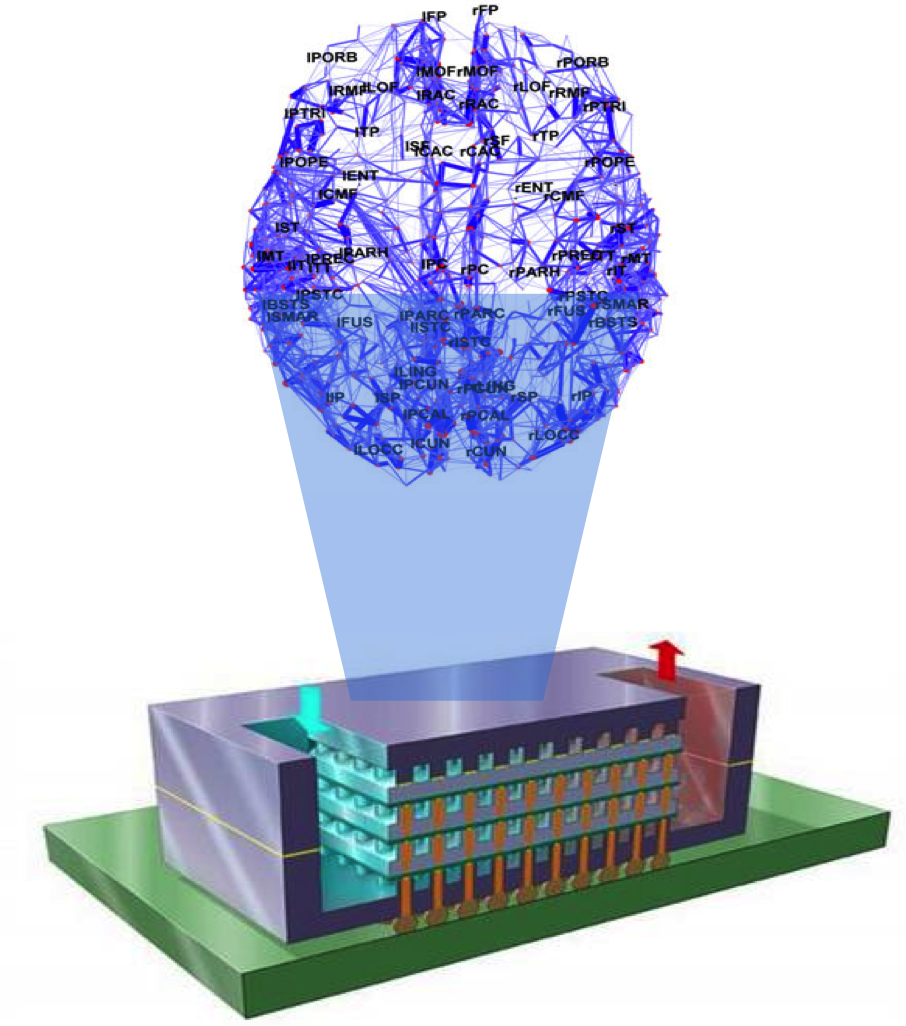Go to
Andrea Acquaviva
Emerging computing paradigms: The case of neuromorphic platforms
New computational paradigms have been opened by the growing understanding of brain and nervous system functionality and signaling mechanisms. The development of electronic systems aimed at mimic the neuro-biological networks of the nervous system, the so called Neuromorphic platforms, are key instruments to deepen this understanding and develop new computational brain-like systems with brain-specific features. These include extreme parallelism, adaptive responsiveness to unknown environments, fault-tolerance, and very low-power consumption.
 As such, biological neural networks are emerging computation systems to solve many practical engineering problems involving learning, classification and recognition tasks. Neuromorphic platforms have to be designed and managed properly to represent a suitable support the computational requirements of these networks, such as extremely parallel execution, dense intercommunication and energy efficiency.
As such, biological neural networks are emerging computation systems to solve many practical engineering problems involving learning, classification and recognition tasks. Neuromorphic platforms have to be designed and managed properly to represent a suitable support the computational requirements of these networks, such as extremely parallel execution, dense intercommunication and energy efficiency.
From a computational point of view, a relevant challenge is to understand how to efficiently map neural networks onto neuromorphic platforms. Indeed, the way in which neurons are mapped into the platform may strongly affect neurpmprpihc platform efficiency in terms of both performance and energy. Because of the computational limitations of the electronic circuits and the large number of neurons and synapses of realistic networks, a suitable resource allocation is critical.
Moreover, considering that these platforms can be integrated into robotic systems, an efficient mapping should take into account interactions with external sensors, where certain signals must arrive efficiently.
As such, the problem of computation allocation on neuromorphic platforms is an intriguing and forward looking one. Techniques inherited from the VLSI world can be used as starting point, however, they must be specialized and adapted to consider the specific nature of the computation, the fact that these systems are not fully deterministic and they can tolerate some losses and the fact that networks should be evolving, considering plasticity and neurogenesis.
In this talk we discuss the recent results about computation mapping on neuromorphic platforms, considering the systems developed inside the Human Brain Project (HBP) as case study.
About the panel speaker:
 Andrea Acquaviva is Associate Professor at Politecnico di Torino, Italy. He received the Ph.D. degree in electrical engineering from the University of Bologna, Italy, in 2003. In 2003, he became an Assistant Professor with the Computer Science Department, University of Urbino, Italy. From 2005 to 2007, he was a Visiting Researcher with the Ecole Polytechnique Federale de Lausanne, Switzerland. In 2006, he joined the Department of Computer Science, University of Verona, Italy. He has been with the Department of Computer Engineering and Automation, Politecnico di Torino.His research interests focus mainly on parallel computing for distributed embedded systems such as multicore and sensor networks and simulation and analysis of biological systems using parallel architectures. In the fields above, he has authored over 140 scientific publications (between 2000 and 2014).
Andrea Acquaviva is Associate Professor at Politecnico di Torino, Italy. He received the Ph.D. degree in electrical engineering from the University of Bologna, Italy, in 2003. In 2003, he became an Assistant Professor with the Computer Science Department, University of Urbino, Italy. From 2005 to 2007, he was a Visiting Researcher with the Ecole Polytechnique Federale de Lausanne, Switzerland. In 2006, he joined the Department of Computer Science, University of Verona, Italy. He has been with the Department of Computer Engineering and Automation, Politecnico di Torino.His research interests focus mainly on parallel computing for distributed embedded systems such as multicore and sensor networks and simulation and analysis of biological systems using parallel architectures. In the fields above, he has authored over 140 scientific publications (between 2000 and 2014).
Secondary navigation
- EPFL Workshop on Logic Synthesis and Emerging Technologies
- Luca Amaru
- Luca Benini
- Giovanni De Micheli
- Srini Devadas
- Antun Domic
- Rolf Drechsler
- Pierre-Emmanuel Gaillardon
- Jie-Hong Roland Jiang
- Akash Kumar
- Shahar Kvatinsky
- Yusuf Leblebici
- Shin-ichi Minato
- Alan Mishchenko
- Vijaykrishnan Narayanan
- Ian O'Connor
- Andre Inacio Reis
- Martin Roetteler
- Julien Ryckaert
- Mathias Soeken
- Christof Teuscher
- Zhiru Zhang
- Symposium on Emerging Trends in Computing
- Layout synthesis: A golden DA topic
- EPFL Workshop on Logic Synthesis & Verification
- Luca Amaru
- Luca Benini
- Robert Brayton
- Maciej Ciesielski
- Valentina Ciriani
- Jovanka Ciric-Vujkovic
- Jason Cong
- Jordi Cortadella
- Giovanni De Micheli
- Antun Domic
- Rolf Drechsler
- Henri Fraisse
- Paolo Ienne
- Viktor Kuncak
- Enrico Macii
- Igor Markov
- Steven M. Nowick
- Tsutomu Sasao
- Alena Simalatsar
- Leon Stok
- Dirk Stroobandt
- Tiziano Villa
- Symposium on Emerging Trends in Electronics
- Raul Camposano
- Anantha Chandrakasan
- Jo De Boeck
- Gerhard Fettweis
- Steve Furber
- Philippe Magarshack
- Takayasu Sakurai
- Alberto Sangiovanni-Vincentelli
- Ken Shepard
- VENUE
- Panel on Circuits in Emerging Nanotechnologies
- Panel on Emerging Methods of Computing
- Panel on The Role of Universities in the Emerging ICT World
- Panel on Design Challenges Ahead
- Panel on Alternative Use of Silicon
- Nano-Bio Technologies for Lab-on-Chip
- Functionality-Enhanced Devices Workshop
- More Moore: Designing Ultra-Complex System-on-Chips
- Design Technologies for a New Era
- Nanotechnology for Health
- Secure Systems Design
- Surface Treatments and Biochip Sensors
- Security/Privacy of IMDs
- Nanosystem Design and Variability
- Past Events Archive

